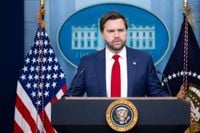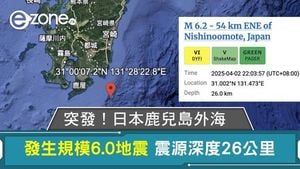US Vice President JD Vance is set to visit Italy later this month, marking his third diplomatic mission to Europe. Vance's visit is scheduled from April 18 to April 20, 2025, coinciding with the Easter weekend. While the specifics of his itinerary are still being finalized, Italian media reports indicate that Vance's team has reached out to Italian authorities to arrange a meeting with Prime Minister Giorgia Meloni.
Meloni, who has been vocal about her support for Vance's recent criticisms of European leadership, stated in a Financial Times interview that she agrees with his assertion that Europe has strayed from its commitment to free speech and democracy. "I have to say I agree," Meloni remarked, adding, "I've been saying this for years... Europe has lost itself a bit." This sentiment underscores a growing rift between European leaders and the US, as Meloni positions herself as a staunch ally of Vance and, by extension, the Trump administration.
In the same breath, the Italian PM has faced criticism from opposition leaders. Elly Schlein, the leader of the centre-left Democratic Party, condemned Meloni's remarks, arguing that her government is turning into the “Trojan horse of the Trump administration within the EU.” This reflects a broader concern among some Italian politicians about the influence of US politics on European affairs.
While Meloni has expressed her belief in strengthening Europe’s defense capabilities, she has also emphasized the need for unity between Europe and the US. She firmly ruled out sending troops to enforce any potential peace deal in Ukraine, stating last month that it is "unimaginable to build effective and lasting security guarantees by dividing Europe and the United States." Furthermore, Meloni has expressed her trust in Donald Trump’s negotiating skills concerning Ukraine, calling him “a strong leader.”
Meanwhile, another significant event unfolded in Europe as German and Italian authorities conducted a major operation against a large-scale fraud scheme linked to the 'Ndrangheta mafia. On April 1, 2025, law enforcement officials arrested dozens of suspects involved in a complex fraud involving high-value food products and pizza-making equipment. The operation, which had been underway for five years, saw hundreds of officers executing around 40 searches across four German states and various locations in Italy.
Reports indicate that 14 suspects, including a police officer, were arrested in western Germany, while 20 individuals were detained in Italy. The accused are believed to have posed as representatives of fake German food companies, ordering substantial quantities of goods without payment, resulting in losses amounting to hundreds of thousands of euros for suppliers. Additionally, they allegedly resorted to threats and extortion to coerce Italian restaurants in and around Stuttgart into purchasing their merchandise.
Italian prosecutors confirmed that the victims of this fraud were Italian companies based in Calabria, the home region of the 'Ndrangheta. This mafia group is notorious for its wealth and influence, particularly in drug trafficking and controlling a significant portion of Europe’s cocaine trade.
In a separate but related development, the UK has implemented new travel regulations affecting citizens of EU and EFTA nations. As of April 2, 2025, travelers from these countries will need an Electronic Travel Authorisation (ETA) to enter the UK. This requirement is part of the UK's broader visa waiver scheme that began in February 2024, initially targeting citizens from several Gulf states.
The ETA, which must be applied for online before traveling, is valid for two years and allows multiple entries during that period. The current fee for the ETA is £10, but it is set to increase to £16 on April 9, 2025. Notably, holders of British or Irish passports, as well as UK visa holders, are exempt from these requirements.
The rollout of the ETA scheme aims to streamline entry into the UK while ensuring that security measures are maintained. The UK government has emphasized the importance of these regulations in the context of evolving global travel dynamics.
As Vice President Vance prepares for his visit, the backdrop of ongoing discussions about European unity, defense, and international relations remains crucial. The upcoming meetings with Meloni may further shape the dialogue between the US and Italy, particularly concerning shared interests in security and political alignment.
With the complexity of these issues at play, Vance's trip to Italy is poised to be significant, not only for US-Italian relations but also for the broader European political landscape. As the world watches, the outcomes of these diplomatic engagements will likely resonate beyond the immediate interactions, influencing future policies and alliances.





